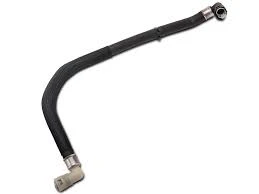Choosing the Right Fuel Hose for E10 Compatibility and Performance Needs
ធ្នូ . 19, 2024 03:57 Back to list
Choosing the Right Fuel Hose for E10 Compatibility and Performance Needs
Understanding E10 Compatible Fuel Hose A Comprehensive Guide
In recent years, the automotive industry has seen a significant shift towards more environmentally friendly fuels. One of these advancements is the increased use of E10 fuel, which is a blend of 10% ethanol and 90% gasoline. While this fuel type offers several benefits, such as reduced carbon emissions and support for local agriculture, it also brings new challenges, particularly regarding fuel compatibility. This article delves into the importance of using E10 compatible fuel hoses and what you need to know to ensure your vehicle runs smoothly and efficiently.
What is E10 Fuel?
E10 fuel is an ethanol-gasoline blend that has become popular in various countries as a means to reduce greenhouse gas emissions and reliance on fossil fuels. Ethanol, derived from corn or sugarcane, acts as a renewable energy source. E10 can be used in most gasoline engines without requiring any modifications. However, the presence of ethanol in the fuel can have an adverse effect on certain materials and components of the fuel system, making it crucial to choose the right fuel hoses.
The Importance of E10 Compatible Fuel Hose
Fuel hoses play a vital role in the vehicle's fuel delivery system. They transport fuel from the tank to the engine, and any issues with these hoses can lead to performance problems or even severe damage. Standard rubber hoses may not be suitable for E10 fuel due to the corrosive nature of ethanol, which can cause them to degrade, swell, or crack over time. This deterioration can lead to fuel leaks, reduced performance, and costly repairs.
E10 compatible fuel hoses, on the other hand, are specifically designed to withstand the chemical properties of ethanol. These hoses are made from advanced materials that resist swelling, cracking, and hardening, ensuring they maintain their integrity over time. By using hoses rated for E10 and higher, vehicle owners can prevent fuel-related issues and prolong the lifespan of their vehicles.
Material Composition
E10 compatible fuel hoses are typically made from materials such as fluorinated rubber or thermoplastics. These materials are known for their excellent chemical resistance and durability. When choosing a fuel hose for E10 use, look for hoses that meet industry standards, such as SAE J30 R9 rating, which indicates they can handle the ethanol blend safely.
e10 compatible fuel hose

Signs Your Fuel Hose Needs Replacement
To maintain optimal vehicle performance, it's important to regularly inspect and replace fuel hoses as necessary. Here are some signs that your fuel hose may need to be replaced
1. Cracks or Splits Visible damage on the exterior of the hose can indicate deterioration. 2. Swelling If the hose appears swollen or misshapen, it may be reacting to the ethanol in the fuel. 3. Leaking Fuel Any signs of fuel leakage around the hoses are a cause for concern and should be addressed immediately. 4. Decreased Performance If your vehicle is struggling to start or experiencing a drop in performance, the fuel delivery system may be compromised.
The Benefits of E10 Compatible Fuel Hoses
Using E10 compatible fuel hoses not only protects your vehicle's fuel system but also enhances its overall performance. The advantages include
- Enhanced Safety Reducing the risk of leaks minimizes fire hazards and potential damage to the vehicle. - Longevity High-quality hoses can withstand the harshness of ethanol-blended fuels, leading to fewer replacements over time. - Cost-Effectiveness While the initial investment may be higher, using compatible hoses can minimize repair costs in the long run.
Conclusion
As the auto industry transitions to more sustainable fuel options like E10, it is crucial for vehicle owners to adapt accordingly. By investing in E10 compatible fuel hoses, you can ensure your vehicle runs efficiently, safely, and sustainably. Regular maintenance and inspections will further enhance performance, enabling you to enjoy the benefits of both modern fuel choices and a well-functioning vehicle. Stay educated about your vehicle’s needs, and make informed decisions to keep it on the road for years to come.
Latest news
-
Seven-Layer Winding A/C Hose Type C-HEBEI KEMO AUTO PARTS TECHNOLOGY CO., LTD|Low Permeability&High Durability
NewsAug.29,2025
-
Seven-Layer Type C A/C Hose-HEBEI KEMO AUTO PARTS TECHNOLOGY CO., LTD|Automotive Air Conditioning Solutions
NewsAug.29,2025
-
Durable Automotive Fuel Line: Car, Diesel & E85 Hoses
NewsAug.27,2025
-
Automotive Fuel Line & Hose Solutions | E85 & Diesel Ready
NewsAug.26,2025
-
Reliable Automotive Fuel Line | E85 & Diesel Compatible
NewsAug.25,2025
-
Durable Car Heater Hose | Quality Automotive Preheater Pipes
NewsAug.24,2025
